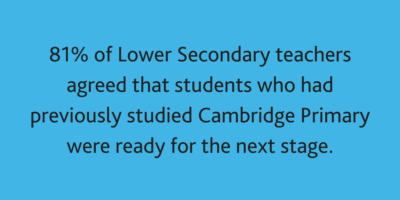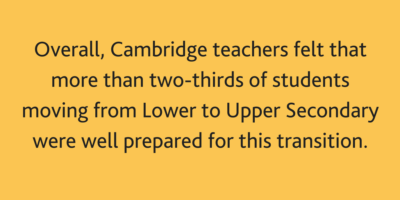The Cambridge Pathway is designed to lead students seamlessly through the different stages of their education from 5-19 (Cambridge Primary, Lower Secondary, Upper Secondary and Advanced), building on and expanding knowledge and skills with each stage. But how do those on the front lines of education – teachers – perceive students’ progression from one stage to the next?
To find out, I conducted a study with my colleagues, Sarah Hughes and Stuart Shaw. We sent questionnaires to teachers at all Cambridge International schools offering more than one stage, and we received 473 responses from 67 countries.
We wanted to explore:
- what knowledge and skills teachers consider important for progression from one stage to the next
- in what ways Cambridge International supports this process
- what could be improved
Are Cambridge International students ready for their next step?
Overall, most Cambridge International teachers consider students to be equipped with the knowledge and skills they need to move into their next programme of study. Eighty-one per cent of Lower Secondary teachers agreed that students who had previously studied Cambridge Primary were ready for the next stage. Sixty-nine per cent of Upper Secondary teachers felt students coming from Lower Secondary were well prepared. And 70 per cent of Advanced teachers said Upper Secondary students were ready for the Advanced stage.

What is key to achieving a smooth progression through the Cambridge stages?
Teachers felt that familiarity with the overall Cambridge International programmes and examination expectations contributed to a smooth progression. Teachers felt subject-specific knowledge was important, but also named skills such as knowledge application, critical thinking and research as being key to successful progression across all Cambridge programmes.
“Students show a variety of techniques when asked to exhibit their skills and do not rely on one source for information. The training given to them in Cambridge Primary to use multiple external sources for information facilitates the objective to be met.”
Cambridge teacher
Smoothing out transitions at higher stages
The transition from Cambridge Lower Secondary to Upper Secondary represents significant changes for students as their course options expand from four subjects (English, English as a Second Language, Mathematics and Science) to the wide choice of subjects taught at the Upper stage. Our survey showed that overall Cambridge teachers felt that more than two-thirds of students moving from Lower to Upper Secondary were well prepared for this transition with the knowledge base they needed. However, we will continue to look for improvements to ensure students have the knowledge and skills they need for this next step.

Teachers reported that certain skills are key to a smooth transition for students moving from Upper Secondary to Advanced programmes. Advanced programmes require students to think and learn independently and to effectively manage their own studying, yet these skills are not developed to the same depth at the Upper Secondary stage. Teachers perceive a jump in the skills required between these two levels, but this is expected as Advanced programmes are intended to be a ‘step up’. Cambridge International is aware of this jump and continues to monitor it to ensure it remains reasonable and supports teachers when assisting students making the transition.
We are reassured that the majority of teachers who are delivering a Cambridge curriculum feel that students completing Cambridge programmes are ready for the next stage of Cambridge learning.
What next?
We are always keen to improve here at Cambridge International, so I will be working with my colleagues to explore our survey results in more detail, using our findings to direct further research and improve the development of our syllabuses and support.





